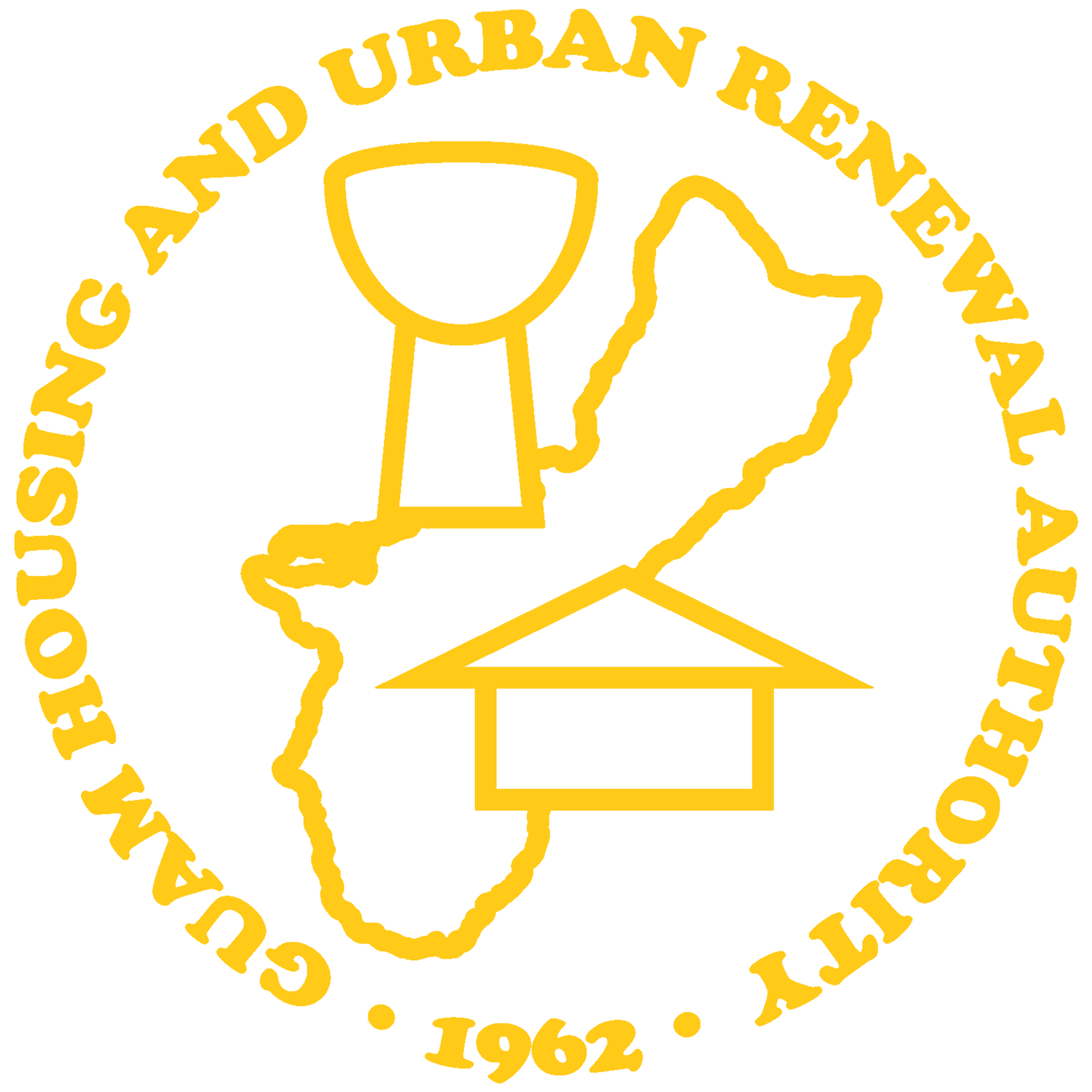The Family Self-Sufficiency program (FSS) was established in 1990 by section 554 of the National Affordable Housing Act. This section amended Title I of the U.S. Housing Act of 1937, by adding Section 23 for the FSS program. FSS is the successor program to Project Self-Sufficiency and Operation Bootstrap.
- What is the Family Self-Sufficiency (FSS) Program?
- What families are eligible?
- How do families apply for the FSS Program?
- How does GHURA select families for the FSS Program?
- What requirements must a family meet to participate in the FSS Program?
- What is the FSS Program Escrow Account?
- What are the responsibilities of the FSS Program Coordinator(s)?
- Does a family have to give up its rental assistance after the family completes the FSS Program?
- How is the FSS Program funded?
- Code of Federal Regulations:
- Contact Information:
- FSS PROGRAM PAMPHLET:
- FSS APPLICATION:
- Program Coordinating Committee (PCC) Partners:
- Business Counseling:
- FSS MEDIA
- FSS PHOTO GALLERY:
- FSS Testimonials:
What is the Family Self-Sufficiency (FSS) Program?
The Family Self-Sufficiency (FSS) program is an employment and savings incentive program for HUD-assisted families that have Section-8 Housing Choice Vouchers (HCV), or who live in Public Housing. Its intent is to assist participating families access needed resources from within the community. FSS empowers HUD-assisted families to increase their earned income and reduce their dependency on welfare assistance and rental subsidies by working collaboratively with its Program Coordinating Committee (PCC) partners to secure commitments of public and private resources for its participants.
There are two main components of the FSS program. The first includes case management services, which helps to identify employment goals, assist in skill-building, and link participants to supportive service programs available within the community to help achieve these goals. GHURA assists participants in becoming and remaining employed, and obtaining higher-paying jobs by enhancing their skill-set. The second component includes the establishment of an interest-bearing escrow (savings) account for the participating family. Any increases to the family’s rent as a result of increased earned income during participation in the FSS program, results in a credit (deposit) to the family’s escrow account. Families who successfully complete the 5-year program may withdraw funds from their escrow account for any purpose, to include, paying for college, obtaining a vocational education, purchasing or repairing a vehicle, or even toward homeownership! Participation in the FSS Program is voluntary, and is not a condition of receiving assistance under the Section-8 Housing Choice Voucher (HCV) and/or Public Housing programs.
Program services offered by the FSS program may include, but are not limited to: Child-Care, Transportation, Education, Job Training and Employment Counseling, Substance/Alcohol Abuse Treatment and/or Counseling, Household Skills Training, and Homeownership.
For more information about the FSS program, please visit:
https://www.hud.gov/program_offices/public_indian_housing/programs/hcv/fss
Top ↑
What families are eligible?
Families who receive assistance under the GHURA Section-8 Housing Choice Voucher Program or the Public Housing Program are eligible to participate under Family Self-Sufficiency. Eligible participants must be in good standing (i.e. no eviction proceedings pending for unpaid rent/charges or cause). An FSS family includes everyone in the household; those 18 years or older are also eligible to obtain services with the FSS program if the head-of-household has signed an FSS Contract of Participation.
Top ↑
How do families apply for the FSS Program?
Applications of Interest are available at the GHURA Main Office, located in Sinajana. You may also download an application at the following link: https://www.ghura.org/sites/default/files/FSS%2520Application_0.pdf The completed application may be submitted at GHURA’s main office, or electronically to FSS Program Coordinator.
GHURA's FSS Program Coordinator may be contacted directly, at:
- Sandrina Cepeda
- FSS Program Supervisor
- Phone: (671) 475-1333
- Email: scepeda@ghura.org
- Reina Capati
How does GHURA select families for the FSS Program?
Families who submit an “Application of Interest”, are placed on the FSS program waitlist. The waitlist is organized by receipt of application (date and time stamp). During the selection process, GHURA uses an objective system that screens applicants for interest, and motivation to participate. Once the selection process is complete, and participant is deemed eligible, the participant is enrolled in the program.
Applicants will be withdrawn from the waitlist if:
- The applicant so requests;
- The housing authority is unable to contact the applicant;
- The family selected fails to appear for their scheduled appointment. (The family selected will be given one opportunity to reschedule. A subsequent no show will result in removal from the waitlist.)
What requirements must a family meet to participate in the FSS Program?
The applicant selected to participate in the FSS program must be the head-of-household, and an active participant in either the Section-8 HCV or Public Housing program. An eligible participant must be in good standing (i.e. no eviction proceedings pending for unpaid rent/charges or cause). The head of each participating family, along with the FSS Program Coordinator, execute a “Contract of Participation” (COP) which specifies the rights and responsibilities of both parties. The 5-year COP outlines goals and services for the head of household, and each participating adult household member. Each participating household member must fulfill all requirements outlined in their respective COP in order to obtain full benefits.
The COP requires that the family comply with their lease; that all participating family members become independent of welfare; and that the head of the family seek and maintain suitable employment.
Possible sanctions for non-compliance with the FSS COP include:
- Termination from the FSS program
- Forfeiture of the FSS program escrow account
- Withholding or termination of supportive services
What is the FSS Program Escrow Account?
The Escrow Account is an interest-bearing savings account established by GHURA on behalf of the FSS family, where deposits are made throughout the duration of FSS participation. Escrow begins if and when a family’s rent increases as a result of increased earned income of the FSS family.
A portion of the escrow account may be made available during the term of the contract if it is determined that the family has fulfilled certain interim goals established in the COP, but requires a portion of the FSS escrow account funds for purposes consistent with completing the final goal as outlined in the COP.
Escrow balances are fully released once the family has fulfilled all of its FSS obligations under the COP, on or before its expiration (including the obligation to be welfare-free for the 12 consecutive months before the FSS contract is completed), and the head of the family certifies (on or before the FSS contract expiration date) that no family member is a recipient of welfare assistance.
FSS escrow funds will be forfeited should the COP be terminated in accordance with regulations, if the family continues to receive welfare 12 months prior to the expiration of the contract term, and/or if the contract terms were not completed at the end of the contract term.
Top ↑
What are the responsibilities of the FSS Program Coordinator(s)?
As the principal front-line staff responsible for implementation, FSS Program Coordinators are the backbone of the FSS program. FSS coordinators coach program participants and provide mentoring, conduct needs assessments, ensure that FSS program participants are linked to the supportive services they need in order to achieve economic self-sufficiency, provide referrals to services and trainings, and help participants stay on track to achieve their goals. FSS Program Coordinators also maintain program records, build partnerships with service providers, report on program outcomes, maintain regular communication with participants, and regularly monitor FSS escrow accounts to ensure accuracy.
FSS Program Coordinators will provide reasonable accommodations for elderly, and/or persons with disabilities, as requested.
Top ↑
Does a family have to give up its rental assistance after the family completes the FSS Program?
No. The law provides that a family may complete its FSS COP and receive its escrow while continuing to receive housing assistance. Although it is hoped that families will no longer need housing assistance upon completion of the FSS program, some families may still require housing assistance after FSS graduation.
Top ↑
How is the FSS Program funded?
Congress appropriates funding for the FSS program through Annual Appropriation Acts for FSS Program Coordinator salaries. Other than these annual appropriations, no other specific funding is provided.
Top ↑
Code of Federal Regulations:
Title 24 – Housing and Urban Development Part 984 – Section 8 & Public Housing Family Self-Sufficiency
Regulations may be found at:
https://www.gpo.gov/fdsys/pkg/CFR-2016-title24-vol4/xml/CFR-2016-title24-vol4-part984.xml
Top ↑
Contact Information:
GHURA's FSS Program Coordinator may be contacted directly, at:
- Sandrina Cepeda
- FSS Program Supervisor
- Phone: (671) 475-1333
- Email: scepeda@ghura.org
- Reina Capati
FSS PROGRAM PAMPHLET:
A copy of the Family Self-Sufficiency Program’s brochure may be downloaded via the following link:
https://www.ghura.org/sites/default/files/FSS%2520Program%2520Brochure%2520II_0.pdf
Top ↑
FSS APPLICATION:
A copy of the Family Self-Sufficiency Program’s application may be downloaded via the following link:
https://www.ghura.org/sites/default/files/FSS%2520Application_1.pdf
- Sandrina Cepeda
- FSS Program Supervisor
- Phone: (671) 475-1333
- Email: scepeda@ghura.org
Program Coordinating Committee (PCC) Partners:
| FSS Program Coordinating Committee Partners | |
| Organization | Phone Number |
| American Job Center | 475-7000 |
| Business Services | 475-4673 |
| Employment Services | 300-4555 |
| America's Small Business Development Center | 735-2590 |
| Pacific Islands Network | 735-2591 |
| Bank of Hawaii | 479-3556 |
| Department of Public Health and Support Services | |
| Works Program Section | 735-7322 |
| 735-7256 | |
| Division of Senior Citizen | 735-7011 |
| WIC Program | 475-0294 |
| Guam Housing Corporation | 647-4143 ext. 143 |
| Guam Housing and Urban Renewal Authority | |
| Renewal Affordable Homes Program | 475-1319 |
| 475-1408 | |
| 475-1405 | |
| Guam Community College | |
| Academic Advisement & Career Placement | 735-1124 |
| Adult Education Office | 735-6013 |
| Project Aim TRIO Program | 735-5585 |
| Reach for College Hagu'i Kuleho Program | 735-1122 |
| Habitat for Humanity | 647-4667 |
| Micronesia Community Development Corporation Self Help | 989-1638 |
| Micronesia Resource Center: One Stop Shop | 686-2227 |
| Salvation Army | 477-3528 |
| 477-3528 | |
| University of Guam | |
| Enrollment Management & Student Services | 735-0277 |
| Enrollment Management & Student Services Career Development Office | 735-2233 |
| Financial Aid Office | 735-2266 |
| 735-2285 | |
- Sandrina Cepeda
- FSS Program Supervisor
- Phone: (671) 475-1333
- Email: scepeda@ghura.org
| Contact: | Guam (America’s) Small Business Development Center Network (Guam SBDC) |
| Telephone: | (671) 735-2590 Fax: (671) 734-2002 |
| Email: | casey@pacificsbdc.com |
| Address: | University of Guam School of Business &Public Administration Jesus & Eugenia Leon Guerrero School of Business Building UOG Station Mangilao, Guam 96923 |
| Website: | http://www.pacificsbdc.com |
Target Population: Existing small businesses and small business start-ups
The Guam SBDC assists with the following:
- Small Business Counseling (free confidential one-on-one counseling in all areas of business management);
- Small Business Training (courses range from introductory workshops for those just starting out in business to advanced programs aimed at enhancing the growth potential of established businesses at low to no cost);
- Small Business Assistance Center (resources available including extensive small business library, computer laboratory, and government & local business resource information);
- Community/Village Outreach (presentations are available to schools, village organizations, and community groups).
SBDC Mission:
The Guam Small Business Development Center (Guam SBDC) is a member of University of Guam’s Pacific Islands Small Business Development Center Network (PISBDCN). Its mission is to support the growth and economic development of the U.S. affiliated islands in the western pacific region by providing high quality training and one-on-one confidential counseling to existing small businesses and to small business start-ups.
Top ↑
- April 15, 2015
Achieving Self-Sufficiency:
- Click to View: https://www.ghura.org/sites/default/files/GHURA%2520Press%2520Release%2520for%2520April%252015%2C%25202015.pdf
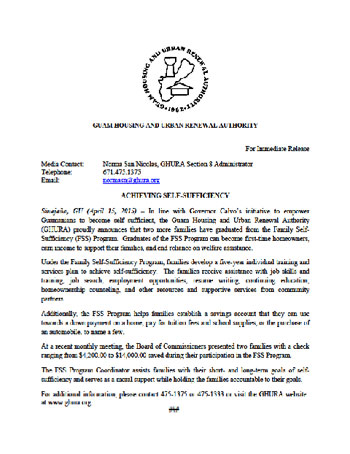
| Contact: | Guam (America’s) Small Business Development Center Network (Guam SBDC) |
| Telephone: | (671) 735-2590 Fax: (671) 734-2002 |
| Email: | casey@pacificsbdc.com |
| Address: | University of Guam School of Business &Public Administration Jesus & Eugenia Leon Guerrero School of Business Building UOG Station Mangilao, Guam 96923 |
| Website: | http://www.pacificsbdc.com |
Target Population: Existing small businesses and small business start-ups
The Guam SBDC assists with the following:
- Small Business Counseling (free confidential one-on-one counseling in all areas of business management);
- Small Business Training (courses range from introductory workshops for those just starting out in business to advanced programs aimed at enhancing the growth potential of established businesses at low to no cost);
- Small Business Assistance Center (resources available including extensive small business library, computer laboratory, and government & local business resource information);
- Community/Village Outreach (presentations are available to schools, village organizations, and community groups).
SBDC Mission:
The Guam Small Business Development Center (Guam SBDC) is a member of University of Guam’s Pacific Islands Small Business Development Center Network (PISBDCN). Its mission is to support the growth and economic development of the U.S. affiliated islands in the western pacific region by providing high quality training and one-on-one confidential counseling to existing small businesses and to small business start-ups.
Top ↑
FSS PHOTO GALLERY:
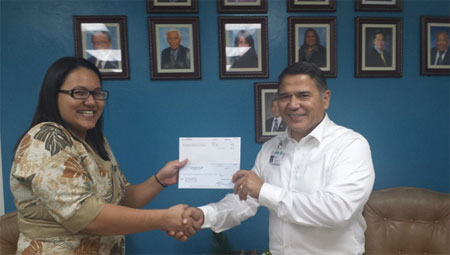
FSS Graduate, Ms. Michele Quichocho (left) and Mr. Michael Duenas, GHURA’s Executive Director (right)
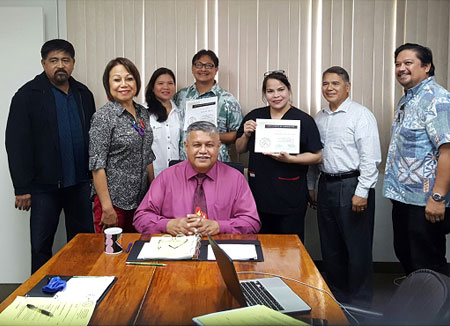
GHURA Board of Directors, and Executive Director congratulate 2017 FSS Graduates, James & Leonor Tabunar, and Ms. Jennifer Guile
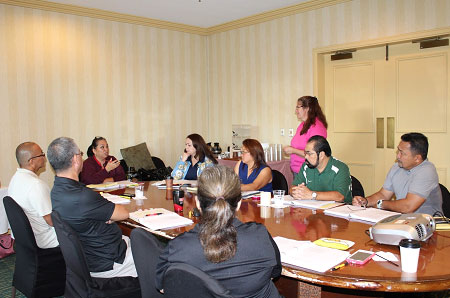
The Guam Housing and Urban Renewal Authority and the Northern Marianas Housing Corporation participate collaboratively in Quadel Consulting’s 2017 Executive Training Workshop with guest trainer, Julie O'Conner
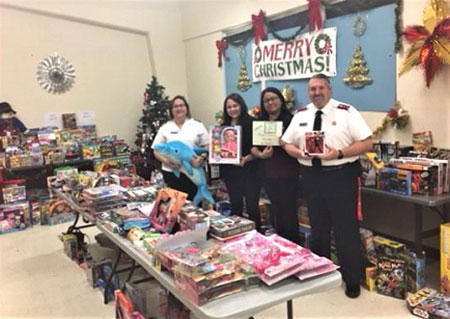
FSS Program Coordinators deliver gifts to the Salvation Army’s 2017 Toys-for-Tots campaign on behalf of GHURA’s Staff & Management
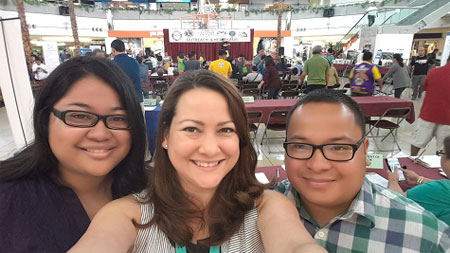
FSS and ROSS Program Coordinators participate in the 2016 Senior Citizens Month Outreach & Health Fair
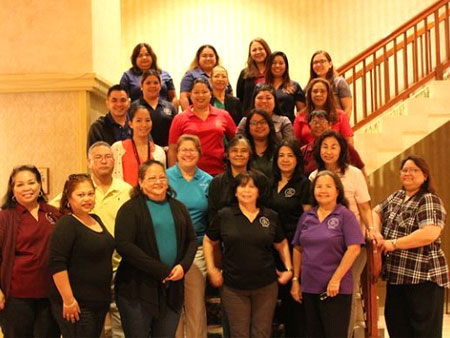
The Guam Housing and Urban Renewal Authority and the Northern Marianas Housing Corporation participate collaboratively to obtain Quadel Consulting’s Housing Choice Voucher Specialist certification, with guest trainer, Julie O'Conner
Top ↑
FSS Testimonials:
“To all of the FSS program participants, do not lose hope in your dreams. With commitment and perseverance, you too can realize your desires of a financially lucrative career toward achieving homeownership by taking advantage of programs available through GHURA”
Vangie Ojeda, Homeowner and FSS Graduate
“My family is very grateful for being part of the GHURA Family Self-Sufficiency program, and for the support and encouragement we received. Thank you GHURA FSS team for this once in a lifetime opportunity, and push to reach our final goal, especially when it seemed very difficult or even impossible to accomplish on time. We encourage others to try the program. There is nothing to lose but so much to gain.”
James Tabunar, Homeowners and FSS Graduate
“I would like to recognize a program that has taught me a great deal of goal settings, with that said; FSS, also known as the “Family Self-Sufficiency Program”, this program is a stepping stone to helping families achieve self-sufficiency, whether it is first time homeowners, on-the-job training or furthering your academic endeavors. Your FSS Coordinator and yourself will keep track with the progress you’ve made and their continued support to see you succeed. I encourage everyone to challenge themselves to being self-sufficient, the feelings of completing the program and the outstanding recognition, is something worth experiencing. I am so grateful for this experience. FSS and the staff at GHURA have guided me and supported me through this journey. Take a chance and make a difference. Reach for the stars!”
Anonymous, FSS Graduate
Top ↑
